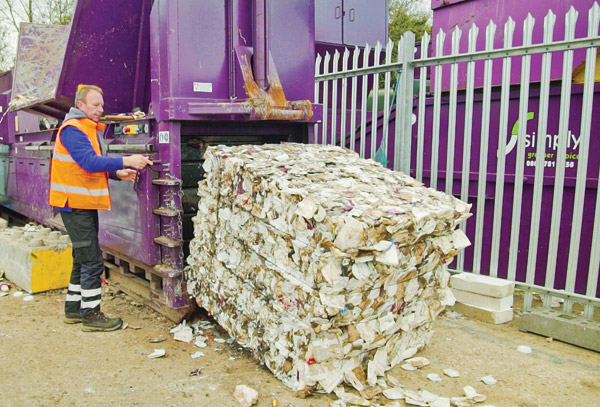
A worker loads a bail of disposable cups destined to be recycled into new products. [Photo/China Daily]
China has tightened restrictions on solid waste imports with stricter permit reviews and more effective oversight of domestic recycling companies since the import ban on such products came into effect last month, the top environmental authority said.
At the start of this year, China banned the importation of 24 types of solid waste in four classes, including unsorted wastepaper and scrap plastic, due to environmental concerns.
Stricter control of import permits for items listed in the group of restricted importation were also implemented as required in central government guidelines issued in July.
As of Wednesday, 306 companies had been granted permits to import solid waste in five batches, according to the Ministry of Environmental Protection.
"Only plants recycling solid waste can apply for import permits, which differs from the previous practice wherein some agencies applied on behalf of the plants, reducing the risks of pollution," said Liu Youbin, a spokesman for the ministry.
In addition, the ministry has been conducting stricter management over production scale and pollution control efforts for wastepaper processing recycling plants, which is an expansion in scope from scrap plastic and retired ships, he said.
The stricter controls, especially decreased import quotas, have driven some domestic recycling plants to find new supplies, mainly from the domestic sources.
In the five import batch quotas, the ministry approved imports of 19,419 metric tons of plastic waste, according to official data. Some surveys showed the government authorized 3.8 million tons of scrap plastic to be shipped to China in the first round in January 2017.
"If this approval rate continues for the subsequent import permit approvals, the major recycling operations in China, which used to rely on imports, will be forced to switch to sourcing from domestic supplies," said Steve Wong, president of the China Scrap Plastic Association.
"The common view of the industry is that there will be no reversal of China's solid waste import policies beginning in 2018."
Wong said the ban has caused a supply gap of about 5 million tons of scrap plastic. The long-term plan is for domestic supply to make up for some of this, with policies for recycling and collection in China coming into effect.
"China's own domestic waste production is increasing," said Meadhbh Bolger, resource manager for Friends of the Earth Europe. "There's lots to develop in their own sectors. They have enough issues with their own domestic waste including increasing that capacity instead of dealing with our European exports as well."
While China is decreasing its solid waste imports, some exporting countries now have to find new destinations for their waste.
The recycling markets in Southeast Asia and India have expanded rapidly, said Wong, though he doubts they will be able to meet all demand, leaving exporting nations no choice but to stockpile much of their scrap or process it themselves.
"Many exporting countries such as Britain, Germany, the United States and Japan are not yet capable of handling the increased volume," Wong said. "Low-end plastic items still have no alternative outlet other than landfills and incineration in exporting countries."

















